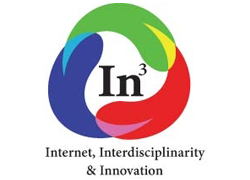IMDEA Networks

Event Category: External Presentation (External Speaker)
Bitcoin. The TCP/IP of finances?
Bitcoin is a decentralized peer-to-peer payments network. It is the first and most widely used example of a new kind of money known as cryptocurrency. Transactions are fast, non-repudiable and almost anonymous. Fees are extremely cheap and every single transaction is stored in a ledger called the block chain.
Read more arrow_right_altIn3 conference: the first international conference on Internet Science
This unique conference will be the venue fostering dialogue among scholars and practitioners belonging to these disciplines.
Event website: http://www.internet-science.eu/1st-internet-science-conference
Read more arrow_right_altMeasuring Large-Scale Distributed Systems: Case of BitTorrent Mainline DHT
Peer-to-peer networks have been quite thoroughly measured over the past years; however it is interesting to note that the BitTorrent Mainline DHT has received very little attention even though it is by far the largest of currently active overlay systems, as our results show. As Mainline DHT differs from other systems, existing measurement methodologies are not appropriate for studying it. In this talk we present an efficient methodology for estimating the number of active users in the network. We have identified an omission in previous methodologies used to measure the size of the network and our methodology corrects this. This omission may lead to inaccuracies of up to 40% in the number of active users. Our method is based on modeling crawling inaccuracies as a Bernoulli process. It guarantees a very accurate estimation and is able to provide the estimate in about 5 seconds. Through experiments in controlled situations, we demonstrate the accuracy of our method and show the causes of the inaccuracies in previous work, by reproducing the incorrect results. Besides accurate network size estimates, our methodology can be used to detect network anomalies, in particular Sybil attacks in the network. We also report on the results from our measurements which have been going on for almost 2.5 years and are the first long-term study of Mainline DHT.
Read more arrow_right_altAdaptable Human-Centric Mobile and Wireless Systems
Information and communication technologies (ICTs) often fail to perform well in environments and scenarios that were not envisioned at the time of the ICTs creation. Examples of such failures include poor usability of traditional WiFi networks in resource-constrained rural areas, geographically-dependent performance of centralised networked systems, and context-insensitive behaviour of ubiquitous computing devices.
Read more arrow_right_altStateless DNS for Efficient Private Service Discovery
Discovering services in the local broadcast domain is easy from the application point of view. However, from the network point of view, especially when wireless networks are also involved, it is wasteful, as query and response are broadcast on all access points at the lowest data rate, ignoring efficient transmission modes. It also does not scale beyond the single broadcast domain, as this would require deployment of IP multicast, which has yet to happen despite decades of trying. We introduce Stateless DNS as an efficient and broader range alternative. Stateless DNS requires no action from the network service provider, improves upon privacy and comes with incremental deployment options. While providing a well-known DNS interface to the applications, it can identify organizational boundaries and uses existing DNS caches for performance.
Read more arrow_right_altThe Rise of the Sharing Economy: Estimating the Impact of Airbnb on the Hotel Industry
Airbnb.com is an online community marketplace that facilitates short-term rentals of "unique spaces" around the world. Since its launch, Airbnb has grown from a few hundred bookings in 2008 to over ten million nights of cumulative bookings worldwide by the end of 2012, spanning more than 300,000 properties in 192 countries. Our work investigates the consequences of the rise of Airbnb as seen by the local economy, focusing on quantifying the impact of Airbnb's growth on the local hotel industry. To explore this question, we consider the state of Texas, where Airbnb adoption exhibits significant spatio-temporal variation across a large number of city-level markets. We leverage a dataset we collected from Airbnb.com, comprehensively spanning the thousands of Texas properties listed on Airbnb from 2008 to 2013, which we combine with a panel of quarterly tax revenue data for all hotels in the state of Texas from 2001 to 2013. Our analysis provides evidence that the hotel industry has experienced a decrease in revenue due to the entry of Airbnb in the market. Specifically, we find that a 1% increase in the size of the Airbnb market results in a 0.05% decrease in hotel revenue. Furthermore, our results indicate that losses are unevenly distributed among hotels in different price segments, with lower-priced hotels experiencing the largest impact.
Read more arrow_right_altReconstructing Barabasi-Albert networks in the number-in-hand computation model
Suppose that we have a network of n processors where each processor knows its own ID and the IDs of its neighbors. Processors communicate in synchronous rounds by writing messages on a whiteboard, which is visible to all of them. The goal is to design a protocol at the end of which every processor knows the topology of the network.
Read more arrow_right_altArchitecting an Evolvable Internet with XIA
Motivated by limitations in today's host-centric IP network, several recent "clean-slate" network architectures have proposed alternate first-class principals, such as content, services, or users.
Read more arrow_right_altResearch in Collaborative Haptic-Audio-Visual Environments
Multimedia and information technology are reaching limits in terms of what can be done in multimedia applications with only sight and sound. The next critical step is to bring the sense of “touch” over network connections, which is commonly known as Tele-haptics. Haptics, a term which was derived from the Greek verb “haptesthai” meaning “to touch”, introduces the sense of touch and force into the human-computer interaction. Currently, research on haptics is broadly categorized into human haptics, machine haptics, and computer haptics. Human haptics is mostly conducted by psychologists to study the mechanism of the “touch” modality, while machine haptics refers to the design of haptic devices to reproduce the sense of “touch”.
Read more arrow_right_altLecture on Advanced topics in Internet Routing with BGP
The Border Gateway Protocol (BGP) is the protocol used among Internet Service Providers to provide IP connectivity among and across their networks. In this course, we will first review the basics of Internet routing with BGP.
Read more arrow_right_alt











Recent Comments